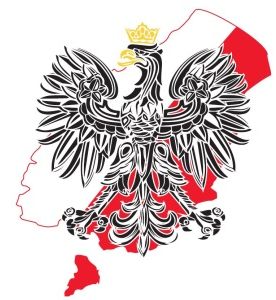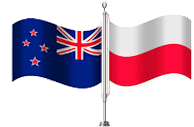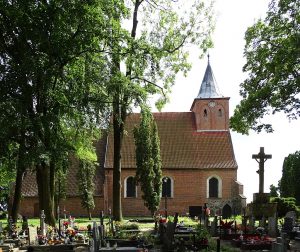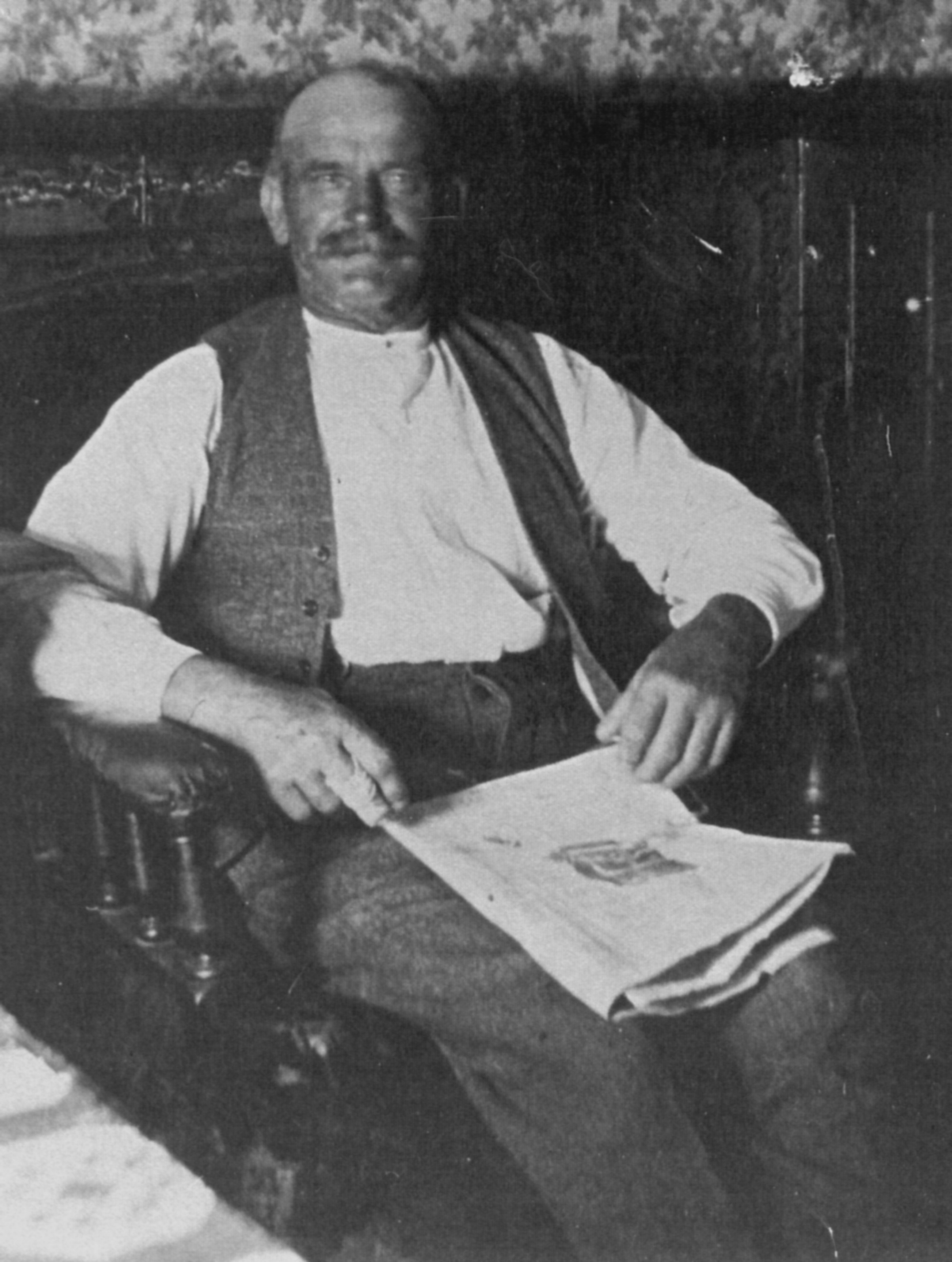
click on name or picture to go to Annis/Halba Family Tree at ancestry.com

Click ship to open the Palmerston ship page
Spoken Polish
If you would like to hear the Polish names and text spoken in Polish then we can help.
Firstly click on this link "Text to Polish" and then copy the text you wish to hear, and paste it into the translation box. You can either listen to it or have it download onto your machine.
Enjoy !!
SURNAMES & THEIR ORIGINS
ANYS/ANIS possibly from German first name Hans or equvalent Jan or from son of Annis (Eng), the popular pronunciation of Agnes. Meaning: Pure/chaste.
BRZOSKOWSKI (Pol) brzoza. Meaning: birch tree, also seen in many habitation names.
ALBA/HALBA is a very old Polish name, which originated some 800 years ago. Meaning: helmet.
OSSOWSKI (Pol) Habitation names such as; Osow, Osowa, Osowo, Ossowo.
Jan Karol Halba (b. 1834–d. 1914) was born at Stanisławie on 17 February 1834, the son of Jakob Alba (b. 1791–d. 1847) and Anna Gędzierska (b. abt. 1797–d. 1852). Jan married on 13 November 1859 at the Church of the Holy Trinity in Lubiszewo-Tczewskie to Brigitta Brzoskowska (b. 27 December 1839 at Dąbrówka-Tczewska–d. 1920), the daughter of Jozef Brzoskowski (b. abt. 1790–d. 1863) and Helena Ossowska (b. 1796–d. 1873). During the Franco-Prussian War (1870-1871), Jan was conscripted into the army. He was later known to fly the Prussian Regimental Banner once a year on his property in New Zealand and was presented with the Regimental Emblem as a tribute indicating that he fought with distinction and courage. Jan in Poland worked as a farm labourer and Brigitta was reputed to be a governess, which indicated a reasonable education. Being unable to have children of their own, Jan and Brigitta raised their nephew Jozef Walenty Anis (b. 1863 at Lisewo Malborskie–d. 1938), as their very own. He was the son of Dawid Anis (b. abt. 1834–d. 1896) and Rozalia Brzoskowska (b. 1830–d. 1876), having had ten children and at least six infant deaths. They left Trczińsk for Hamburg where they set sail aboard the Palmerston on 29 Jul 1872, arriving at Port Chalmers near Dunedin on 6 December 1872.
Listed aboard were: Johann C. Halba age 39, Johanna 30 and Joseph 9. The family were sent south to Scroggs Creek on contract work with Brogden and Sons to lay the southern railway through the Taieri. By mid-March, 1873, they were living in Gull Street, Waihola where John purchased their property later the next year. Here he built the family a small but abiding sod brick hut (still standing). It had a mud floor, no windows, one door and measured four by two point five metres in size and was about three metres high at the peak. Bridget brought out with her from Poland a brass pestle and mortar, which has been handed down through the family. She was regarded as having a very frugal streak to her nature but leading the pioneer lady’s usual hard life.
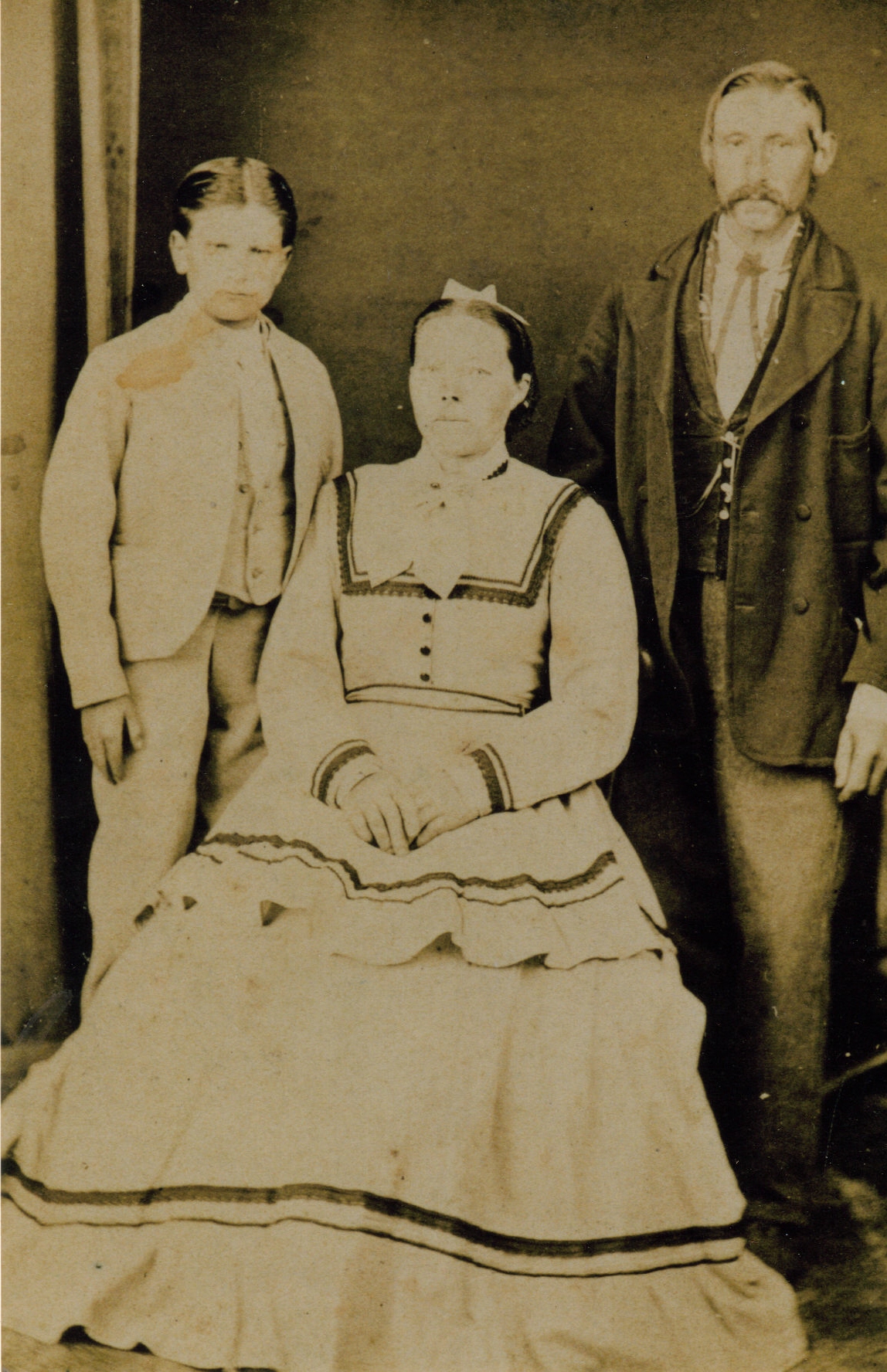
Joseph Annis/Halba, Bridget and John Halba, courtesy of Alan Halba. Timaru
“WASTE LANDS BOARD. Mr Charles Hilgendorf, on behalf of the undermentioned persons, applied that they should be allowed to purchase the respective areas held by them at Waihola under license from the late Provincial Government, under section 29 of the Land Act, 1872: — Johann Halba, sections 4 and 5, block XIX. It was explained that the applicants were Polish immigrants. It was resolved to recommend the Government to allow applicants to purchase at £3 per acre.” Bruce Herald, 9 August 1878, p 6
“MAGISTERIAL. R. M. COURT, MILTON. (Before J. K Wood, Esq., R.M.) Tuesday, February 12, 1884. The following persons were fined for permitting their cattle to stray on the public road at Waihola. —John Helber, 1 cow, 2s 6d, and costs.”Bruce Herald, 15 February 1884, p 3
“Two men who had met with accidents were received into the Hospital yesterday, and treated by Dr Garland. One was Joseph Walker, of Kurow, who was kicked by a horse on the leg, and received a severe wound. The other was a man named Halba, who had three of his toes crushed by a railway track passing over them while at work on the Livingstone railway. It is not expected that the toes will require to be amputated.” North Otago Times, 12 March 1886, p 2
After the railway work on the Taieri was completed, John took a horse and sledge into the hills behind Waihola and cut manuka to sell or barter with. He was also employed as a labourer and tried his hand at farming. According to the 1882’ Return of Freeholders, John owned 21 acres to the value of £150 at Waihola.
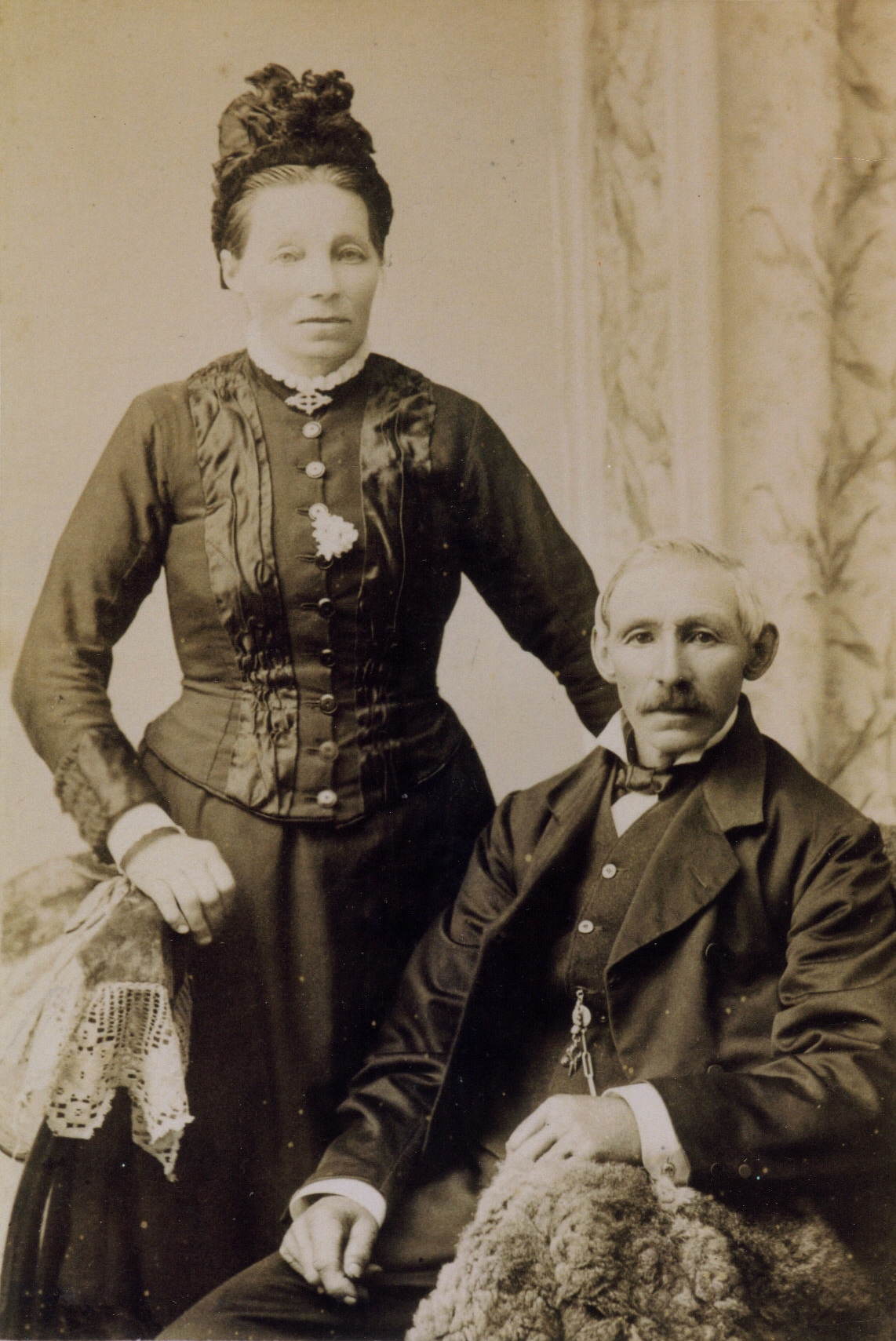
Bridget and John Halba, courtesy of Alan Halba
“R.M. COURT, MILTON. (Before W. H. Revell, Esq, R.M.) Wednesday. 13 th March, John Halba v. August Orlowski. Claim, £10, damages for removing oats. Mr Stewart for plaintiff, and Mr Reid for defendant. Mr Stewart stated that plaintiff purchased from C Hilgendorf certain sections at Waihola, in which was growing a crop of oats. Hilgendorf had before this purchased from Mr Kilgour. When the oats were ripe, defendant entered on the land, cut and removed the crop. Plaintiff, in his evidence, stated the area sown as 1 acre 3 roods, and thought it would throw 40 bushels per acre, and that defendant removed the crop. In cross-examination, he stated that defendant had been in possession of the ground about three years. Mrs Orlowski had sown the crop when defendant was in the hospital. He purchased the land long after the crop was sown. For the defence, Mr Reid said his client had occupied under Mr Kilgour for three years. There was no writing, but a verbal agreement was made in the presence of two witnesses by Mr Kilgour. It was to the effect that defendant could have the use of the ground for three years certain; and if Mr Kilgour did not want the property then, defendant could occupy same until it was required, and that he should have the first offer of purchase. The consideration for the agreement was that defendant should pay the rates and securely fence the land. The fencing had cost £20, and the rates had been regularly paid. Before the expiration of the term, defendant’s sister called on Mr Kilgour to know if he would sell, but he declined. Mr Smith had also written twice to know if he would sell on the expiration of the three years, and received word back that the land would not be sold. On the strength of that, and relying on the previous agreement, defendant ploughed the land and sowed the crop. Before it ripened, plaintiff stated that he had purchased. Defendant then wrote to Mr Kilgour, but received no reply. Under these circumstances counsel contended that his client was entitled to the fruits of his labor, and cited authority in support. Defendant and three witnesses gave evidence, and his Worship nonsuited plaintiff, with costs 17s, witnesses’ expenses 27s, and professional costs 21s.” Bruce Herald, 15 March 1889, p 3
John, a farmer at Waihola, was naturalised as a New Zealand citizen on 10 October 1893.
Peter Brzoszkowski writes the following letter from the village of Liebschau (Lubiszewo Tczewskie) to his uncle Jan & auntie Brigitta Halba in New Zealand in 1894.
Greeting from far away. Liebschau (Lubiszewo Tczewskie), 8th of December, 1894. Praised be to Jesus Christ. I reach for my pen to write to you with happiness and tears in my eyes as I hear that you are alive my dear Uncle and Auntie. I could not speak as I had tears in my eyes when the parish priest told me the news in his office.
Dear Uncle and Auntie, I was always under the impression that you were dead and had already ordered a few masses for the repose of your souls in your memory.
Dear Uncle and Auntie, I have written to you a letter in which I posted a photo of myself in army uniform, but I received no reply.
Dear Uncle and Auntie, please answer me. You would like to know what wife I have. I have married Julianna Ludwichowska and my children are, Franz 17 years, Johanna 15 years who died, Anna 13 years & Michal six years. My brother Franz is in Klein Malsau (Małżewko), my brother Jakob is in Sachsliben (Szczerbięcin) employed as master baker, Pauline married a carpenter and Anna married a bricklayer, but I do not know any of my brothers-in-law.
Dear Uncle and Auntie, myself and my brother Frank, we are well. I live in Liebschau. Dear Uncle and Auntie, please send me your photographs. We all send greetings to you Uncle and Auntie and your son Joseph. Peter Brzoskowski. Letter courtesy of Peter Chiles.
“FOR SALE, Four-roomed HOUSE, Barn, and four-stalled Stable, Coal shed, Fowl house, &c. Three Acres of Ground – one sown in Grass. Orchard, comprising 100 Fruit Trees (Apples, Pears, Plums, and Cherries, &c.) and 100 Gooseberry and Currant Bushes. Fences in good order. Situated in Waihola Township. 14my JOHN C. HALBA.”, Otago Witness, 14 May 1896
“Milton Magistrate’s Court. (Before Mr R. S. Hawkins, S. M.) Monday, February, 13 1899. Old Age Pensions… John Carl Halba, Waihola, disallowed, having property over the value…” Bruce Herald, 14 February 1899, p 5
John died at his residence in Waihola on 19 May 1914 aged 80 and Bridget, who preferred to live almost in isolation, died on 7 December 1920 aged 80 at her son’s residence at Circle Hill. They are buried at the Waihola Cemetery.

Bridget and John Halba in front of their cottage at Waihola with the Prussian Infantry Regiment flag proudly displayed on their right, courtesy of Alan Halba. Timaru
Józef (Joe) Walenty Halba (Anis), was born at Lisewo Malborskie on 19 August 1863. Joseph was sent to school for a short period until he was 12 years old. In 1875 he worked alongside his uncle John learning the art of plate-laying. He worked in both Islands for the New Zealand Railway. Joseph married on 30 December 1891 at St. Mary’s church in Milton to Teresa Augusta Barra (b. 1863 at Gniszewo–d. 1939), the daughter of Peter Albrecht Barra and Eleonora Wilhelmina Maas. For a brief time, Joseph worked with other Poles from Waihola on the tram lines in Melbourne in the early 1890s. The family were: John (b. 1893–d. 1893), Rosalie Theresa (b. 1895–d. 1933), John Peter (b. 1901–d. 1942), Theresa Josephine (b. 1902–d. 1977), Joseph Francis (b. 1906–d. 1966) and Leonora Bridget (b. 1907–d. 1949). For a time, they lived at Waihola, Taihape, Lawrence, Circle Hill and finally settled down in Milton. After farming at Circle Hill, Joseph worked for the Milburn Lime and Cement Company until health forced him to retire. Alan Halba recalls his grandfather, Joe Valentine, always kept a tin matchbox full of gold nuggets on his person. It was known he would clamber into his boat and row across the Waihola lake in the Berwick direction. Many followed him, but not a soul ever spotted him. He would stay away a couple of nights then reappear at home – matchbox full once more. Often the chasers would return home just to find Joe at home watching them, often wet and hungry. They lost their sense of humour very quickly and in time many gave up following him. Joseph died on 11 February 1938 at Milton and is buried with his wife at the Fairfax Cemetery.
“The hand of death fell suddenly on Mr Joseph Valentine Halba at his residence, Spenser Street, Milton, on Friday evening. He had just finished his evening meal and was going outside when he collapsed at the back door from a severe heart attack. He was carried inside, and attempts were made to revive him. He rallied slightly, but passed away shortly before the arrival of medical assistance. No inquest is necessary, a certificate being forthcoming.” Bruce Herald, 4 Februrary 1938
“Mr Joseph Valentine Halba, who passed away with tragic suddenness at his residence, Spenser Street, last Friday evening, was born in Liepshau, Germany, in August 1863, so that he was in his 75th year at the time of his demise. At the age of 11 years, he emigrated with his parents to New Zealand, in the sailing vessel Palmerston, landing at Port Chalmers and settling at Waihola. At 12 years he was learning plate laying with his father, and assisted in laying the railway between Christchurch and Bluff for the New Zealand Government. Later he was foreman for about three years of a section on the North Island Main Trunk railway, and he then assisted in laying the Catlins line. In 1893 he married Teresa Barra, of North Branch, the wedding being solemnised at Milton. Shortly before he was due to retire on superannuation he purchased a farming property in Circle Hill district, relinquishing this after about seven years to reside in Milton. He worked at the Milburn Lime and Cement Company’s works at Milburn until about two years ago, when an operation forced him to retire from active labours. He never took any part in outside affairs, being content with his home life. His widow and four members of the family of five are left to mourn the loss of a devoted father. The members of the family are John and Joseph, Misses Teresa and Nora, all resident in Milton. Another daughter, Rosalie (Mrs J. Wilson), died about five years ago.” Bruce Herald, 17 February 1938
Theresa died at Balclutha Hospital on 4 December 1939 aged 76 and is buried at the Fairfax Cemetery near Milton.
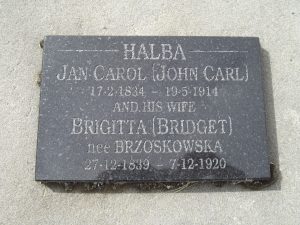
John and Bridget Halba, Roman Catholic Block 7 Plots 2 and 3 at Waihola Cemetery
References
Pobόg-Jaworowski, J. W, History of the Polish Settlers in New Zealand, ed. Warsaw; Chz “Ars Polonia.” 1990, p 22, 32, 33, 43, 168 & 198.
Research Sources
Archives New Zealand, Passenger Lists, 1839-1973, FamilySearch.
Archives New Zealand Te Rua Mahara O Te Kawanatanga; Land Records.
Catholic Diocese of Dunedin, St Mary’s Church, Milton; Baptism Register.
Fairfax Cemetery Records, Dunedin Public Library.
Halba Alan, Timaru, provided photos, information & genealogy.

Joseph and Therese Halba, Block 11 Plot 160 at Fairfax Cemetery near Milton
Konczewice, Lubiszewo Tczewskie, Miłobądz & Subkowy Parish Records, Pelplin Diocese, Poland.
New Zealand Department of Internal Affairs Naturalisations, Births, Deaths and Marriages.
New Zealand Government Property Tax Department, from the rates assessment rolls, Return of Freeholders of New Zealand 1882, published 1884.
Websites
Fairfax Cemetery – Joseph Halba (1863-1938) – Find a Grave Memorial
Waihola Cemetery – Brigitta Brzoskowska Halba (1839-1920) – Find A Grave Memorial
Waihola Cemetery – Jan Karol “John Carl” Halba (1834-1914) – Find A Grave Memorial
Compiled by Paul Klemick (2023)
Chairperson ..... Ewa Rożecka Pollard
Phone ......+64 3 477 5552
Secretary ..... Anna McCreath Munro
Phone ..... +64 3 464 0053
Facebook ..... Poles Down South
Contact Poles Down South
Poles in New Zealand We would like to hear from Poles or people with any Polish connection, who visited New Zealand and particularly those of you who paid a visit or lived anywhere in Otago or Southland.
....................
Polski “Poles Down South” jest stroną internetową organizacji polonijnej w Nowej Zelandii działającej w rejonie Otago i Southland na Wyspie Południowej. Siedzibą organizacji jest Dunedin.
